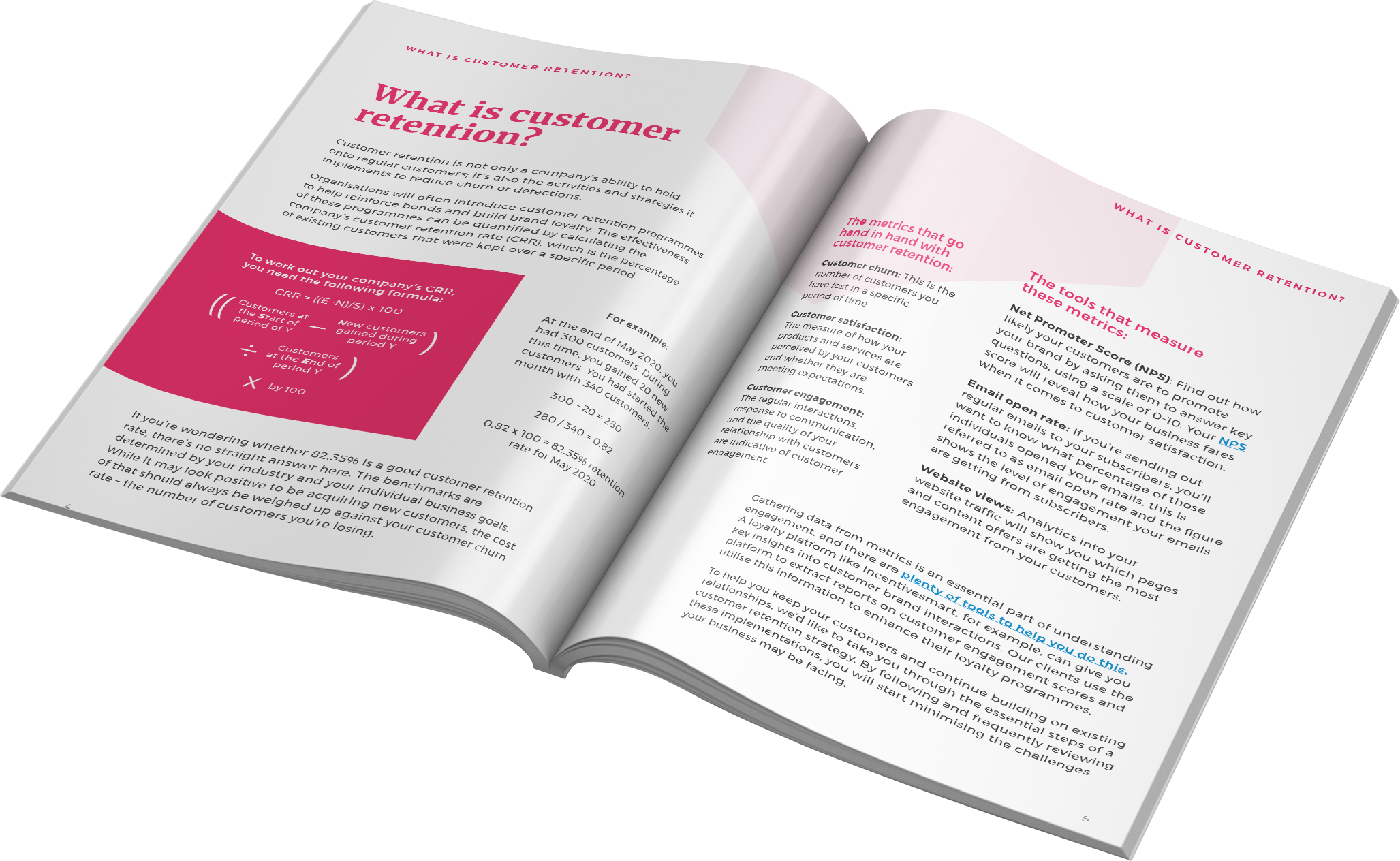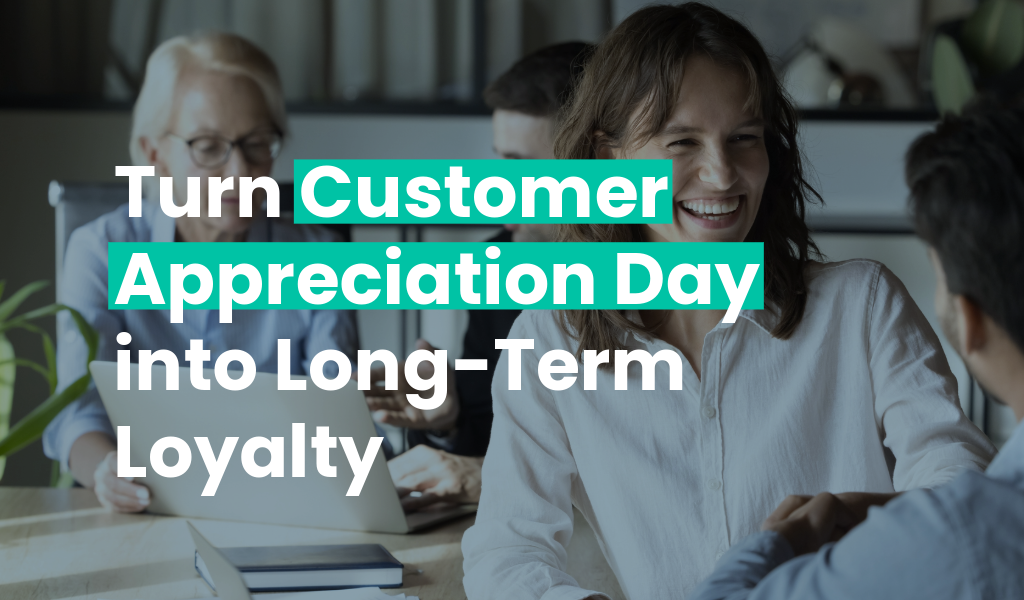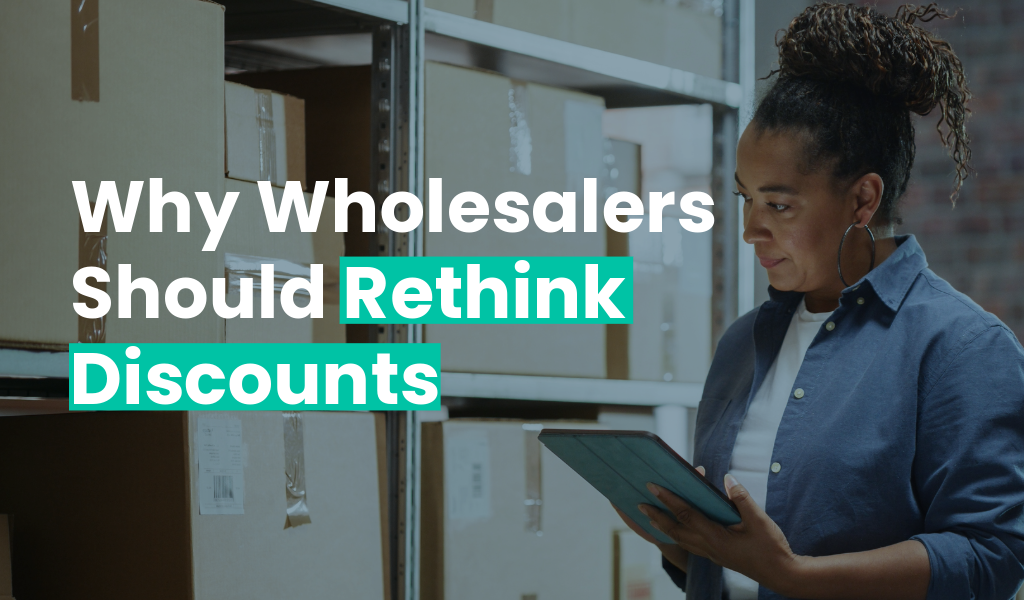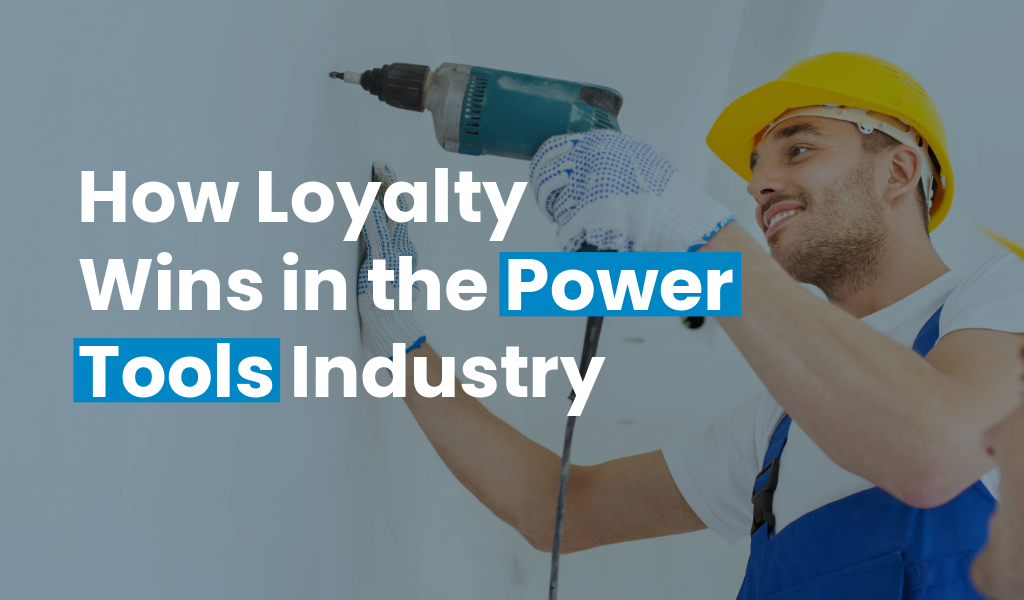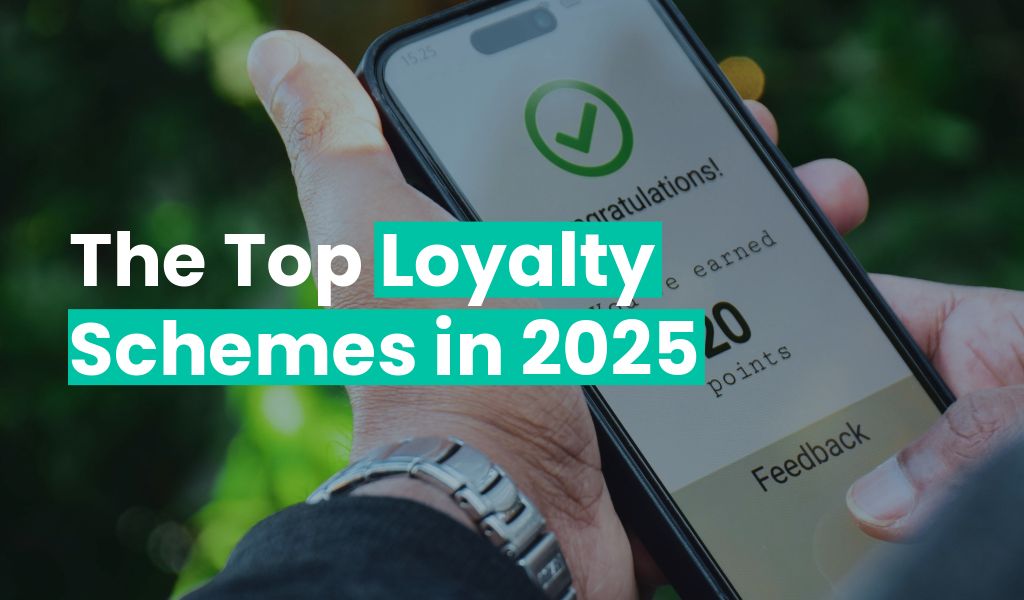


More than 90% of companies choose to roll out customer loyalty schemes and we’ve shortlisted some of the best examples of customer loyalty programmes in action below.
Loyalty programmes like these have proven themselves as invaluable tools, not only for boosting revenue but also for fostering positive brand affinity.
So it’s no surprise that a whopping 84% of consumers say they’re more likely to stick with a brand that offers a customer loyalty scheme.
In fact, 66% reveal that the chance to earn rewards actually influences how they spend their money.
It’s no secret that it’s far more cost-effective to sell to existing customers than to constantly chase after new ones. That’s why brands have jumped on the loyalty programme bandwagon. However, there are a number of different scheme types which fit into different categories, depending on the business profile and of course, the target audience.
Skip to:
- Top loyalty scheme examples:
- - Retail loyalty (IKEA, The North Face, Waterstones)
- - Card-based loyalty (Boots, John Lewis, Nandos, Barclaycard)
- - Online loyalty (Amazon, GymShark, Nike)
- - Tiered loyalty (Starbucks, Sephora)
- - Supermarket schemes (Tesco, Sainsbury's, Lidl)
- - B2B Loyalty schemes (Abode, Miele)
- - Other loyalty schemes we love (British Gas, British Airways)
- Industry-specific loyalty programme examples
- Small business loyalty ideas
- Video podcasts about Loyalty
- A unique example
- Loyalty scheme mechanics
- The different types of customer loyalty
- Customer loyalty programme myths
The best loyalty scheme examples from leading brands we all love
Below, we’re going to explore the best loyalty schemes offered by industry-leading brands.
These examples are a great source of inspiration and insight into how some of the best UK and global businesses effectively engage and retain their customer base through innovative strategies.
Retail loyalty programmes
IKEA

IKEA Family is IKEA’s very own loyalty club, boasting over 110 million members globally.
The great news is that IKEA Family is open to everyone, and it comes at no cost – with zero membership fees to worry about.
As an IKEA Family member, customers unlock a variety of perks, including discounts on select home furnishing products, food items, and services. Plus, on weekdays, customers can savour complimentary tea or coffee while they shop.
But there’s more. IKEA hosts exclusive member-only events within its stores, featuring free home furnishing workshops and early previews of upcoming product ranges. To keep customers inspired and informed, they’ll also receive regular newsletters with the latest news and updates.
Customers also benefit from the all-important ‘Oops-assurance’. This means that in case something doesn’t quite go as planned during your journey from the store to home or while assembling your purchases, IKEA has you covered.
The North Face

The North Face, known for its outdoor gear and clothing, has a unique way of keeping customers loyal with its XPLR Pass programme. This isn’t your typical rewards programme – it’s all about giving you choices to fit around your lifestyle.
Here’s how it works:
When you shop, you earn points, just like any other rewards programme. But what makes it special are the extra ways you can earn points. You can get points for going to special events hosted by The North Face, checking in at specific places, or even just downloading their app.
When it’s time to use those points, The North Face offers you more than just discounts. They offer experiences. Imagine using your points to go on a mountain climbing adventure in Nepal – it’s not all about buying things, but making lifelong memories.
Now, not every business can send people on fancy trips like hiking in Alaska. But the idea is the same: make a loyalty programme that fits your customers and makes them feel closer to your brand. Give them rewards that match their lives and dreams.
Waterstones Plus
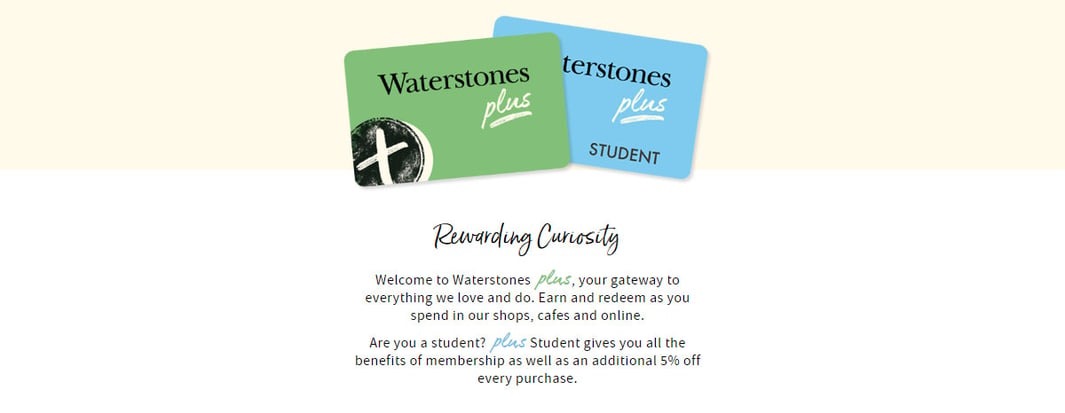
Waterstones, a prominent bookseller celebrated for its vast selection of literary treasures, introduced “Waterstones Plus” as an exclusive offering for book enthusiasts.
This loyalty scheme is a literary haven for avid readers, offering a delightful way to enhance their book-buying experience. Here’s what you can expect:
- Earning and redeeming points: As part of the Waterstones Plus programme, members have the opportunity to earn points with every purchase. These points can then be thoughtfully redeemed, allowing readers to indulge in more of their favourite books without stretching their budget.
- Access to special events: Waterstones understands that reading isn’t just a solitary endeavor—it’s a communal passion. That’s why Waterstones Plus members receive exclusive invitations to special events. These gatherings might include book launches, author signings, or literary discussions, providing a unique opportunity to engage with the literary community.
- Exclusive discounts: In addition to earning points, members are treated to exclusive discounts that cater to their love of reading. These discounts may apply to new releases, bestsellers, or even niche genres, making it easier for book lovers to explore their literary interests.
Card-based loyalty programmes
Boots
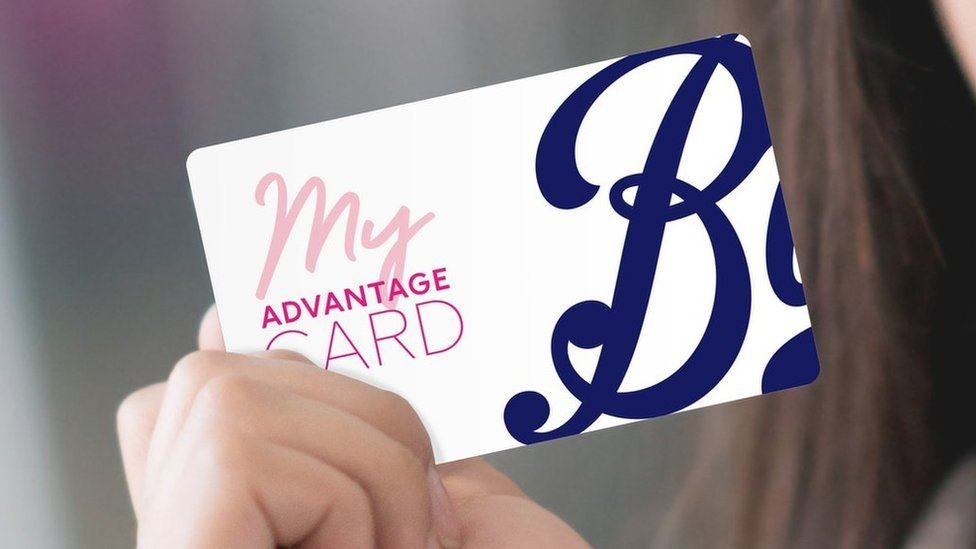
The Boots Advantage Card is one of the most well-known and widely used loyalty programmes in the UK.
Let’s take a closer look at the Boots Advantage Card and its key features:
- Earn points: Customers who sign up for the Boots Advantage Card earn points on their purchases. Typically, they earn four points for every £1 spent, making it easy for members to accumulate points quickly. The accumulated points can be redeemed for discounts on future purchases. Customers can use their points to get money off their shopping, effectively making their next purchase more affordable.
- Personalised offers: Boots uses customer data to personalise offers and promotions. Advantage Card holders often receive special offers tailored to their shopping habits, helping them save money on products they frequently buy.
- Birthday treat: Advantage Card holders typically receive a special birthday treat from Boots, which can range from bonus points to discounts on specific products.
- Health and Beauty Magazine: Members often receive a subscription to Boots’ Health and Beauty magazine, providing them with valuable tips, advice, and information on health and beauty products.
John Lewis
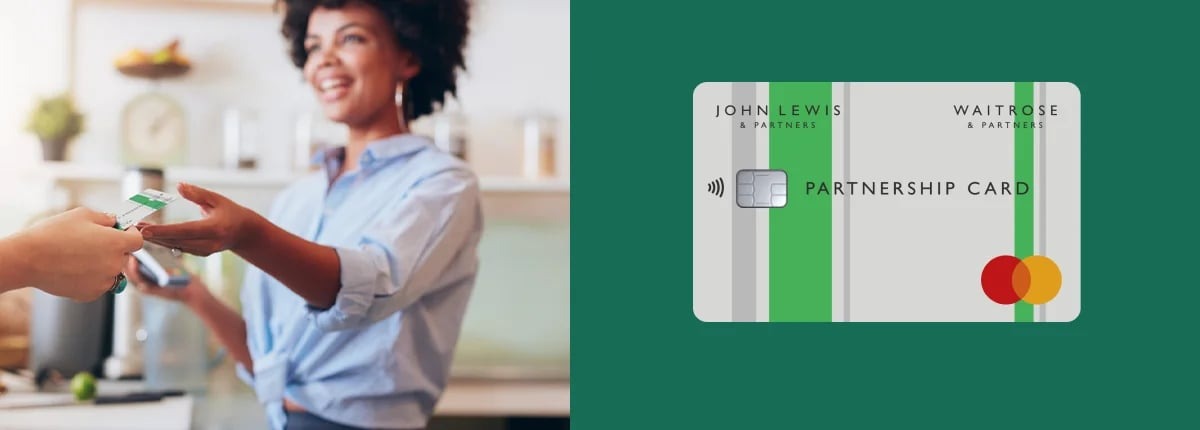
The John Lewis Partnership Card is a unique and customer-centric credit card that goes beyond the conventional credit card offerings.
Tailored to enhance the shopping experience at John Lewis and Waitrose stores, it provides cardholders with an array of benefits that add value to their everyday purchases, including:
- Reward points: Cardholders earn points on their card for every eligible purchase they make, both within and outside of John Lewis and Waitrose. These points can be redeemed while shopping at either store.
- Flexible redemption. Rather than limiting rewards to specific products or categories, cardholders can use their points to shop for a wide range of items, from home furnishings to gourmet groceries. This flexibility empowers customers to choose how they want to enjoy the rewards they’ve earned.
- Exclusive offers: Cardholders also gain access to exclusive offers and promotions. These offers may include discounts, special deals, or limited-time sales events that cater specifically to cardholders.
- Early access to sales: Timing can be everything when it comes to snagging the best deals. Cardholders benefit from early access to sales at John Lewis and Waitrose, ensuring they have the first pick of discounted items. This early access can be especially advantageous during peak shopping seasons and major sale events.
Nandos

Nando’s, may be best known for its delicious peri-peri chicken, but it also offers a card-based loyalty programme called ‘Nando’s Rewards’.
Nando’s Rewards members earn points with every purchase they make at Nando’s restaurants. Points are typically earned based on the total spend, encouraging customers to visit Nando’s repeatedly and gain more and more points.
Points can be used to claim a variety of tempting treats, from their legendary chicken dishes to sides, desserts, and even drinks – and Nando’s even knows how to celebrate birthdays in style. Rewards members receive a special birthday treat, which often includes a complimentary meal or dessert, making your special day even more memorable.
What’s more, you’ll also have access to exclusive offers and promotions. These offers can include one-off discounts, limited-time menu items, or special combo deals that are only available exclusively to program members.
It’s super easy to manage points by downloading an app, where participants can view available rewards, and stay updated on the latest Nando’s news and promotions.
Barclaycard
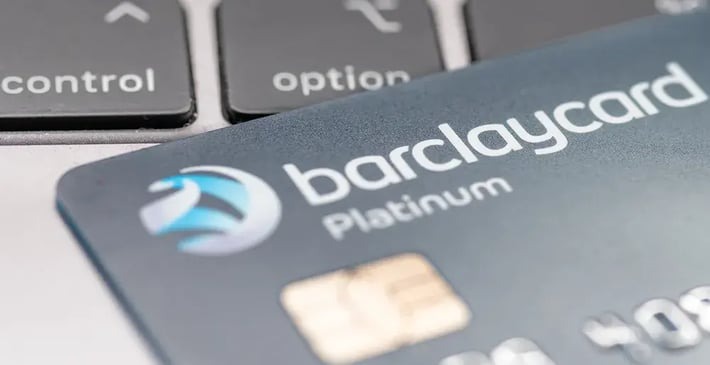
Barclaycard Rewards is another loyalty programme where cardholders can earn points on their purchases. These points can be accumulated based on spending at various retailers and merchants that accept Barclaycard.
The programme offers a straightforward earning structure, where a certain number of points are earned per pound spent. Then points can be redeemed for rewards such as:
- Vouchers: Gift vouchers or e-gift cards from a wide range of retailers, allow cardholders to treat themselves.
- Cashback: Points can often be converted into cashback, either as a credit on the cardholder’s account statement or transferred into their bank account, providing a direct financial benefit when times are tight.
- Travel Rewards: Some Barclaycard Rewards members choose to redeem points for travel-related benefits, such as airline tickets, hotel stays or car rentals.
- Merchandise: Depending on the specific programme, points might be redeemable for a selection of merchandise items ranging from electronics and gadgets to household goods and more.
Online loyalty schemes
Amazon Prime

Amazon Prime is a subscription-based loyalty scheme offered by Amazon.
While it may not seem obvious as a loyalty programme, due to having to pay a monthly fee, there are a number of benefits that customers are treated to which cannot be overlooked. These include:
- Fast and free shipping: Amazon Prime members enjoy free and expedited shipping on millions of eligible items sold on Amazon. This includes free two-day shipping, same-day or one-day delivery in select areas, and even ultra-fast delivery options like Amazon Prime Now.
- Amazon Prime Video: Members gain access to Amazon Prime Video, a streaming service that offers a vast library of movies, TV shows, and original content produced by Amazon.
- Amazon Music: Subscribers have access to Amazon Music, Amazon’s music streaming service, which provides ad-free listening to a vast library of songs and playlists.
- Amazon Prime Reading: Members can borrow e-books, magazines, comics, and more from the Amazon Prime Reading catalogue and read them on their Kindle devices or the Kindle app.
- Amazon First Reads: Prime members have early access to new books from popular authors, allowing them to download one free e-book each month from a selection of titles.
- Amazon Family: Prime members with families can access exclusive family-oriented offers, such as diaper discounts and family-friendly content.
- Amazon Photos: Subscribers get unlimited photo storage with Amazon Photos, as well as 5 GB of additional storage for videos and documents.
- Prime early access: Members often receive early access to new product launches and releases, allowing them to be among the first to try out new items.
Gymshark Family

E-commerce membership programmes diverge from traditional loyalty rewards by not relying on spending-based incentives.
Online workout fashion retailer, Gymshark is just one example of this. The brand provides modest perks in exchange for valuable data, such as email addresses, while promoting its products in the process.
Here are some of the loyalty perks customers can expect in this programme:
- Exclusive content: Gymshark offers exclusive workout routines, nutrition plans, and fitness tips to Gymshark Family members through its app or newsletter.
- Early access: Members can gain early access to new product releases or limited-edition collections.
- Personalised recommendations: By collecting data on members’ fitness preferences and goals, Gymshark can provide personalised product recommendations and fitness resources, enhancing the overall member experience.
- Community engagement: Gymshark can facilitate member-to-member interactions through its app or online community. This can include forums, challenges, and discussions where members can connect, share their progress, and motivate each other.
Nike
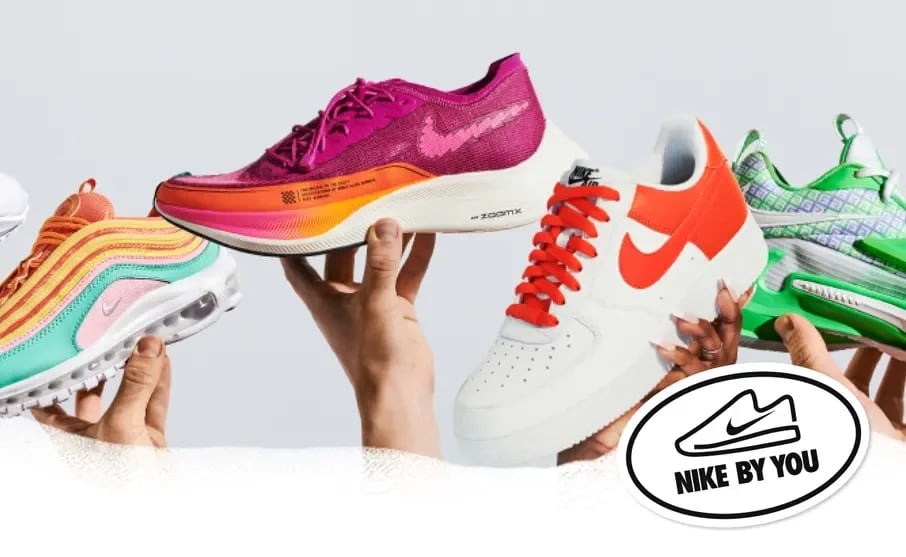
NikePlus, Nike’s innovative online loyalty programme, stands out from the traditional rewards and discounts approach.
It offers a comprehensive ecosystem designed to enhance the overall experience for its members, that is completely unique to any other fitness or fashion brand in the global market.
Its innovative customer perks include:
- Early Access to product releases: One of the standout features of NikePlus is the privilege of early access to new product releases. Members get a sneak peek and the opportunity to purchase the latest Nike footwear, apparel, and accessories before they become widely available.
- Rewards for physical activity: Beyond being a ‘standard’ loyalty scheme, NikePlus is also geared towards promoting an active lifestyle. Members can earn rewards by engaging in physical activities, whether it’s tracking a run, participating in fitness challenges, or completing workout sessions. These rewards can be in the form of exclusive badges, virtual trophies, or even discounts on future purchases.
- Events and challenges: NikePlus frequently hosts events and challenges that encourage members to push their limits, whether it’s a virtual race, a community challenge, or a local Nike-sponsored event.
- Nike Training Club (NTC) Access: Members can access the Nike Training Club app, which offers a vast library of workouts and training plans led by world-class trainers. This provides additional value and helps members achieve their fitness goals.
Tiered loyalty programmes
Starbucks

Starbucks, a global coffeehouse chain, has implemented a tiered loyalty system called “Starbucks Rewards” – and it’s free to sign up.
This system is designed to cater to a diverse range of customers, from occasional coffee drinkers to die-hard Starbucks enthusiasts. Here’s an overview of what the program consists of:
Green Level (Welcome Level):
This is where all members start. Members at this level earn 2 “Stars” (loyalty points) for every dollar spent.
- They receive a free birthday reward, which can be used to redeem a complimentary drink or food item.
- Access to order ahead and pay using the Starbucks mobile app, which enhances convenience.
Gold Level:
To reach the Gold Level, a member needs to earn 300 Stars within a year. This encourages more frequent visits and spending. At this level, members continue to earn 2 Stars for every dollar spent.
- They receive a personalised Gold Card, symbolising their status.
- After reaching Gold status, members can redeem 125 Stars for a free drink or food item.
- Exclusive access to double-star days, which enable members to earn rewards faster.
Platinum Level (Starbucks Reserve® Card):
Starbucks Rewards’ Platinum Level is designed for the most dedicated coffee aficionados.
- To reach Platinum status, a member needs to earn 600 Stars within a year.
- Platinum members earn 2 Stars for every dollar spent.
- They can redeem 150 Stars for a free drink or food item.
- Exclusive access to monthly double-star days and access to premium Starbucks Reserve® coffee.
In-App Challenges and Bonus Stars:
Starbucks also runs in-app challenges and promotions where members can earn bonus Stars for specific actions, such as trying new menu items or making multiple visits within a certain timeframe.
Sephora

Sephora, the renowned beauty retailer, has implemented a highly successful tiered loyalty system called “Sephora Beauty Insider”. This multi-tiered programme caters to beauty enthusiasts and shoppers who seek personalised experiences and exclusive perks for their loyalty.
In addition to their spending benefits, the brand offers customers the opportunity to indulge in exclusive privileges, including access to special events, meet-and-greet opportunities, early product access, and gift cards, collectively referred to as “Experiences.”
Here’s a brief overview of what customers can expect:
Beauty Insider (Entry Level):
This is the starting point for all Sephora customers. Members earn 1 point for every dollar spent on purchases.
- A birthday gift is provided during the member’s birthday month.
- Access to free beauty classes and in-store beauty services.
- Members can redeem points for rewards from the Beauty Insider Rewards Bazaar.
Very Important Beauty Insider (VIB):
To reach VIB status, members need to spend a specific amount within a calendar year, typically around $350.
- VIB members earn 1.25 points for every dollar spent.
- All Beauty Insider benefits are included.
- Exclusive access to VIB-only product launches, collections, and events.
- Sephora offers seasonal savings events with higher discounts for VIB members.
Rouge (Top Tier):
To achieve Rouge status, members must spend a substantial amount within a calendar year, typically around $1,000.
- Rouge members earn 1.5 points for every dollar spent.
- All Beauty Insider and VIB benefits are included.
- Access to even more exclusive products and experiences.
- Free standard shipping with no minimum purchase required.
- Unlimited access to the Sephora Beauty Studio for makeovers and personalised sessions.
Supermaket schemes
According to another whitepaper from Mando on British loyalty, supermarket loyalty schemes have a had a 17% rise in membership from 2022 to 2024. This could be , in part, due to the member pricing explosion witnessed over the past few years, but in any case, let’s have a look at some of the most popular loyalty schemes in the UK…
Tesco Clubcard
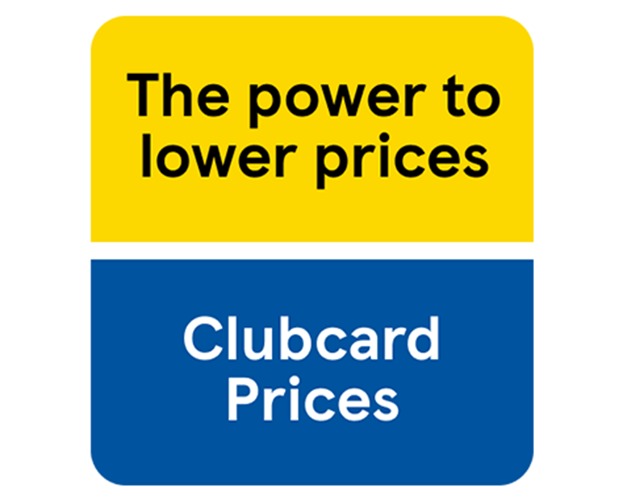
Often considered the gold standard of customer loyalty, the Tesco Clubcard has seen many evolutions in its time. Launched in 1995, customers can earn points every time they spend money in store or online, with every pound spent equating to one point.
In 2009, every pound spent instore and online would instead earn 2 points, but this was reverted to its original offering in 2011.
The biggest change to Clubcard was the 2020 introduction of ‘Clubcard Prices.’ Clubcard members get a discount on their everyday items with the savings calculated at the till, giving a tangible reward with every in-store visit.
More recently, Tesco has teamed up with EagleAI to help gamify the Clubcard experience. Due to the unrivalled amount of customer data Tesco has been able to collect, Clubcard challenges will offer personalised challenges to 3 million users, offering the opportunity to earn up to fifty pounds worth of points. Tesco has promised that the value will double to one hundred pounds worth of points if the trial is successful.
Sainsbury’s – Nectar Card
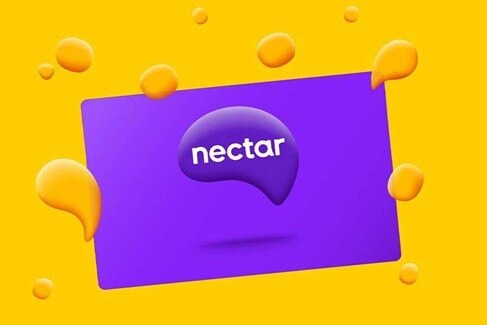
Nectar Points launched in 2002 merging Sainsburys, BP and Barclaycard loyalty points system. Similar to the Tesco Clubcard, shoppers earn one point for every pound they spend instore, online or with their many partners.
The value of the points are slightly less generous than Tesco’s equivalent, with 500 points equating to £2.50. Following Tesco’s success with the vast amounts data it was able to collect through its Clubcard Prices introduction, Sainsbury’s followed suit in April 2023. Sainsbury’s have gone one step further in offering personalised discounts with additional savings on items you purchase regularly by using it’s SmartShop option.
Another key differentiator is the option to earn and spend Nectar points with Sainsbury’s many partners including Argos, eBay and British Airways.
LIDL Plus Loyalty App

Straying from the earn-points-to-spend model, LIDL offers an app-based discount solution that offers discounts on certain items. For example, you get a free bakery item when you spend £50 a month.
LIDL is naturally a budget supermarket and wouldn’t therefore be able to launch a money-off scheme without raising its prices – and nor does it need to. The rewards offered do improve the more you spend though, with £2 voucher offered when you spend £100 in-store each month.
Gamification is a key feature on the app, with a digital scratchcard offered after each shop, offering the chance to win money off your next shop. Although the budget supermarket has taken steps to offer a loyalty scheme, unlike Tesco and Sainsbury’s, it is not essential to use to save money on your weekly shop.
B2B loyalty schemes
According to Gartner only 10% of B2B businesses focus on retaining existing customers. By introducing a loyalty scheme in your business, you can learn more about your customers, encourage sales of your products and keep employees more informed, motivated and engaged.
Although B2B loyalty schemes are similar to their B2C counterparts in some ways, there are unique challenges and advantages to B2B programmes. Selling to clients typically yields more profit than selling to customers, so retention of those clients is imperative.
The more engaged the end users are with the programme, the more engaged that customer/partner will be with the business. So, we’ve put together some great examples of different types of B2B programmes in action below…
Abode

Abode is renowned for award winning product design across its extensive range of sinks and taps in the kitchen and bathroom industry.
They wanted to ensure that retailers were well-informed about their product range and promoted effectively. They recently launched a loyalty scheme for kitchen retailers to earn points whenever they sell Abode products, giving them an advantage over competitors and a reason for the retailers to push Abode over other options. Some key features of the scheme include:
- Educational resource area
- Real-time analytics dashboard
- Earning points by product
- Creating product focus
- Exciting and engaging rewards
Did it work?
The first quarter results were very promising, with over 50,000 points awarded in the first three months. Peter Phelan, the sales Director said, ‘We are delighted to be able to provide a programme where our customers can earn points on every product purchase, let them accumulate, and then spend them on fantastic rewards.’
Miele

Miele is a premium manufacturer of domestic appliances and commercial equipment. They identified that a lack of brand and product knowledge was instrumental in designers recommending competitor brands over their own, leading to missed sales opportunities.
They acted by launching a points-based loyalty scheme to engage, communicate, educate and reward their dealer network, aiming to achieve the desired behavioural change. The solution included:
- Points awarded for sales
- Product and brand information hub
- Better value rewards system
- Points awarded to employees
- Simplified claims process
The results speak for themselves, they saw:
- 19% growth in sales in the first few years
- 74% growth in points awarded in the first 4 years of the programme
- 62% growth in the average number of appliances sold per claimed customer order
- 186% growth in the number of different products claimed
It’s clear from those results that Miele’s loyalty efforts have continued to go from strength to strength, demonstrating significant progress.
Other loyalty schemes we love
British Gas
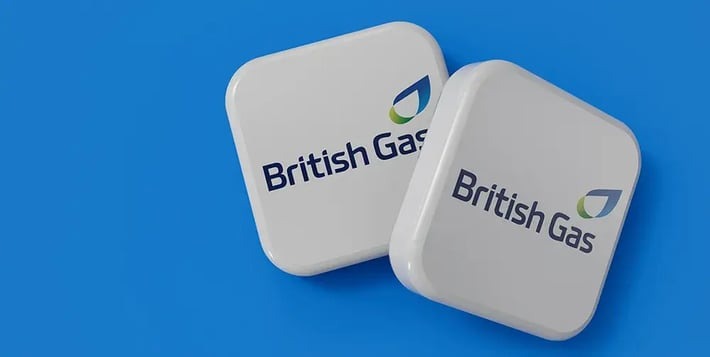
British Gas Rewards operates on a system where customers earn points primarily through their energy usage and engagement with additional British Gas services. Points accumulation is tied directly to the amount of energy consumed, typically measured in kilowatt-hours (kWh), during each billing cycle. This means that the more energy a customer uses, the more points they can potentially earn.
Here’s how it works:
Earning points
- Energy usage: Points accrue based on the amount of gas and electricity consumed by the customer.
- Additional Services: Beyond energy consumption, customers can earn points by opting for supplementary services offered by British Gas. This may include boiler servicing, smart home installations, insurance products, etc. With each service subscribed to, a set number of points is earned.
- Promotional Offers: British Gas periodically introduces promotions that allow customers to earn bonus points for specific actions. These can include signing up for paperless billing, referring new customers or participating in seasonal campaigns.
Redeeming rewards
Points can be redeemed for rewards such as…
- Discounts on energy bills: The primary benefit of British Gas Rewards is the ability to redeem points for discounts on future energy bills. Customers can choose to apply their accumulated points towards reducing the cost of their next bill, providing direct financial savings.
- Partner Rewards: British Gas collaborates with a diverse range of partners across retail, dining, travel and more. Points can often be exchanged for vouchers or discounts at these partners, offering customers flexibility in how they use their rewards.
British Airways

The British Airways Executive Club is a prestigious frequent flyer programme designed not only for BA but also extended to its partner airlines.
It serves as a testament to British Airways’ commitment to rewarding the loyalty of frequent travellers with a comprehensive range of exclusive benefits and privileges aimed at enhancing every aspect of their travel experiences.
Here are some of the benefits on offer:
Earn Avios points
Members of the Executive Club accumulate Avios points, the programme’s currency, on flights operated by British Airways, its partner airlines and hotel stays and car rentals booked through British Airways.
Avios points can be redeemed for flights to numerous destinations, upgrades to premium cabins, hotel accommodations, car rentals and experiences like spa treatments or wine tastings.
Elite member privileges
The Executive Club rewards its most frequent travellers with elite status, unlocking a host of exclusive privileges.
Elite members enjoy priority check-in and boarding to expedite their travel experience. They also have access to luxurious airport lounges worldwide, where they can relax in comfort and enjoy complimentary amenities before their flight.
Additional perks often include extra baggage allowance, priority baggage handling and the opportunity to earn bonus Avios points on qualifying purchases.
How specific industries harness loyalty programmes
Streaming services
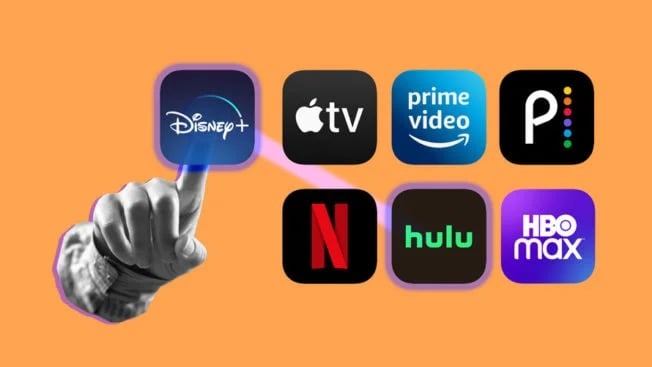
Subscribers earn points or badges for streaming content regularly. These rewards could unlock access to exclusive content, ad-free streaming, or early releases.
Did you know that by using a rewards credit card, you’ll receive a cashback benefit of up to 6% on a vast number of eligible streaming services, such as Netflix and Disney+, Hulu and Amazon Music Unlimited?
Travel agencies
Online travel booking platforms have revolutionised the way people plan and book their holidays, but the excitement goes far beyond simply booking a holiday.
One of the key hallmarks of travel rewards is the accumulation of points or airmiles with each booking made. Whether it’s reserving flights, hotels, rental cars, or even holiday packages. Then, the earned points or miles serve as a currency that travellers can redeem for future travel bookings, or even upgrades (such as travelling in business class) or access to exclusive airport lounges.
Some programmes even offer early booking privileges, allowing members to reserve their holidays before they become available to the general public. This can be especially advantageous during peak travel seasons or for securing highly sought-after accommodations.
Food delivery services
The rise of online food delivery services has transformed the way people enjoy their favourite meals from restaurants, bringing the convenience of restaurant-quality food to their doorsteps. But with takeaway restaurants competing for custom, many food delivery apps have introduced loyalty programmes to entice hungry customers to keep coming back for more.
When users order frequently, they may receive percentage-based discounts, as well as free delivery, so they don’t have to worry about those annoying hidden charges. They may also gain access to special promotions such as limited-time offers, combo meal discounts, or early access to new menu items or restaurant partnerships.
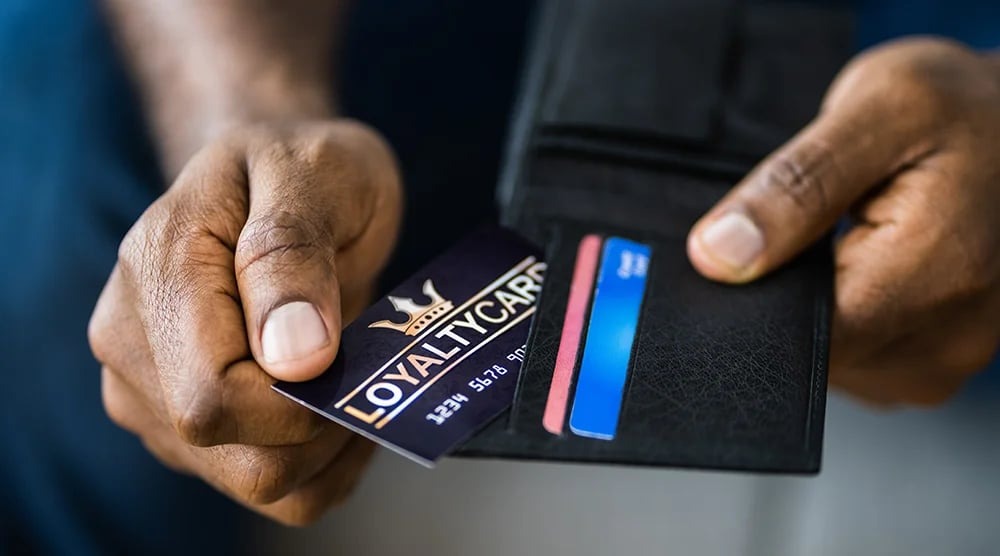
Ideas for small business loyalty programmes
Not got the same budget of the big players shown above?
No problem. small businesses can hop on the loyalty bandwagon quickly and affordably too.
Loyalty schemes for smaller companies just finding their feet or local businesses are typically characterised by their simplicity. They often involve straightforward mechanisms and need to be cost-effective.
Their purpose is not only to provide exclusive savings and discounts to loyal customers but also to create a sense of community encouraging business in local towns and cities, as well as online.
Here are some ways small businesses can encourage customer loyalty:
- Punch cards: Create a simple punch card system where customers receive a stamp or punch for each purchase. After a certain number of stamps, they earn a discount or a free product. This straightforward approach encourages repeat visits.
- Referral rewards: Encourage customers to refer friends and family to your business by offering rewards for successful referrals.
- Birthday treats: Send personalised birthday discounts or gifts to participants. It’s a genuine way to show appreciation (while encouraging them to visit your business during their special day).
- Cross-promotions: Partner with other local businesses to cross-promote each other’s loyalty programmes. For example, a coffee shop and a nearby bookstore could offer joint rewards for customers who visit both establishments on a regular basis.
- Feedback Incentives: Encourage customers to provide feedback through surveys or online reviews by offering small incentives, like a discount on their next purchase.
- Special events: Host members-only events, such as private sales, workshops, or tastings, to make loyal customers feel valued and appreciated.
Now for some real-life examples…
A local coffee shop
A small, independently owned coffee shop may offer a loyalty card where customers receive a stamp for each coffee purchased, and after a certain number of stamps, they get a free drink of their choice.
You could also consider hosting special events or coffee tastings exclusively for loyalty cardholders, which fosters a deeper connection with customers and encourages them to visit your shop, over competitors in the same town.

Independent gym
Creating a loyalty programme tailored to an independent gym can be a strategic move to not only retain existing members, but also attract new fitness enthusiasts. Here’s an expanded look at how such a program can be designed:
1. Loyalty point accumulation
Here members earn loyalty points for every visit or workout session which can be tracked electronically through a membership card or a mobile app. Each visit contributes to their loyalty point balance, then loyalty points can be redeemed for various rewards, including:
- Discounts on monthly or annual membership fees.
- Complimentary personal training sessions or nutritional consultations.
- Access to exclusive gym events, workshops, or wellness seminars
2. Tiered rewards structure
Programmes can be structured with multiple tiers, each offering increasing benefits as members accumulate more points. For instance:
- Bronze Tier: Members reach this level after a set number of visits, typically around 10 to 20. At this stage, they may unlock benefits like a small discount on membership fees.
- Silver Tier: Achieved after a higher number of visits or loyalty points, this tier could offer additional perks such as a discount on personal training sessions or access to premium classes.
- Gold Tier: Reserved for the most dedicated members, the Gold tier can provide substantial benefits, including significant discounts on membership fees or exclusive access to advanced fitness programs.
3. Personalised member experience
To make the scheme more engaging, a gym could use member data to personalise fitness recommendations. For example, members at different fitness levels could receive workout plans tailored to their goals, whether it’s weight loss, muscle building, or overall health improvement.

Pet grooming service
Pet groomers play an essential role in keeping our furry friends well-kempt, but in a competitive market, retaining customers is key. How can they prevent your customers from going elsewhere? Starting up a loyalty programme of course!
Here are some ideas this type of small business could use as part of their strategy:
- Pamper points for pet owners: Loyal pet owners earn “Pamper Points” with each visit to the grooming service. After a predetermined number of visits, typically around 5 to 7, customers qualify for a free grooming session for their furry friend.
- Pet of the Month showcase: Recognise and celebrate loyal customers by featuring a “Pet of the Month” on your social media platforms and website. Encourage customers to share photos and stories of their pets and why they love your grooming service. The chosen “Pet of the Month” could receive a special grooming session or spa day, creating excitement and engagement among your clientele.
- Pet product samples for top-tier members: Elevate your loyalty programme with tiers, and reserve the highest tier, perhaps called “VIP Pet Parents,” for top-tier members. Members at this level receive not only the benefits of lower tiers but also exclusive perks like free pet product samples.
- Special events and pet parties: Organise pet-friendly events or parties exclusively for participants and their pets. These gatherings can include pet costume contests, playdates, or educational sessions on pet wellness.
- Priority booking: Give members priority when booking appointments. This can be especially beneficial during peak grooming seasons or busy times of the year.
Loyalty schemes in Europe
We know loyalty schemes are popular in the UK, but how does it compare to our European counterparts? Overall, we seem to be a bit fan of loyalty schemes, ranking 3rd in Europe with 77.2% of adults in the UK being a member of a loyalty scheme.
The rise in loyalty schemes in the last 12 months, could be attributed to the cost-of-living crisis, with rewards becoming more relevant and attractive. Many big brands have launched national loyalty schemes to capture data and attract and retain customers, some notable schemes launched recently is Pret, McDonald’s and Asda.
Norway leads the way with a staggering 85.7% of adults being part of a loyalty scheme whilst Turkey is trailing last at 31.3%.
Overall, according to Mando’s ‘Understanding Loyalty in Europe 2.0’ whitepaper, loyalty programme impact remains very positive in 2024, with 42% saying membership makes them very loyal, 35% say they are more likely to recommend the brand, 31% are more emotionally connected and 29% will spend more with a brand when a member of its loyalty programme.
Video podcasts about Loyalty
Insights on Emotional Loyalty
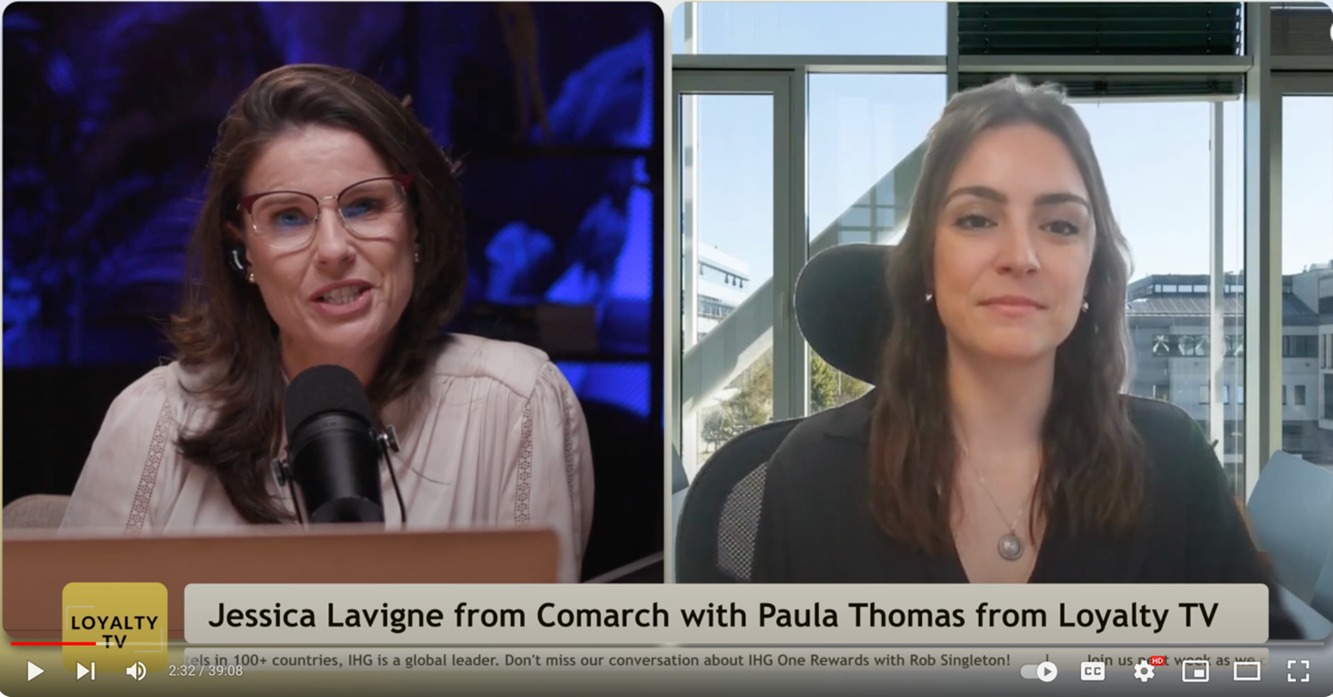
In this intriguing podcast, Jessica Lavigne from Comarch talks about an e-book she wrote that found that 76% of French customers enrol in a loyalty programme to get discounts. In the podcast, Jessica mentions that she thinks when a brand tries to sell you something off the bat – hint; it kills the emotional experience right away!
Creating memories for your customers before trying to sell them something is paramount – moving customers from an ‘acquaintance’ to a ‘friend.’ She talks about how brands need to go one step further and create a relationship with customers. In a relationship you need to talk to your partner and surprise them, something which brands have forgotten about, you can watch the whole episode here:
When loyalty programmes go wrong
In this episode, Jeannie Walters fields questions from listeners about problems they’ve had with loyalty programmes. One listener cites the example of going to a store specifically to use a discount they had received, but the QR code didn’t work, this creating a negative experience for the listener, that should have been a positive one.
It shows that if the correct infrastructure isn’t in place, the programme could be more detrimental than if the brand didn’t have one at all.
Jeannie gives an example of great loyalty in action. She’s an American Express cardholder and whenever she calls in, they acknowledged how long she has been a member, leaving a lasting good impression and feeling valued.
She mentions that consistency is key, and gives an example of the Starbucks programme not being available at sports arenas, which will give people the impression of sporadic unavailability. You can watch the full episode here:
Quirky/ unique schemes: An environmental conscious loyalty example
Perfectdraft

Who doesn’t like a discount on beer and doing a bit of recycling at the same time? The Perfectdraft beer tap was an innovative product to enter the market during the pandemic, when pubs were shut and canned options were not cutting it, the home beer tap burst on to the scene.
Pubs and restaurants have the distribution options to receive and send back beer kegs but sending them straight to consumer was a problem. The kegs could not be conventionally recycled and the cost for Perfectdraft to replace them would be unsustainable, both financially and environmentally.
Enter Beer tokens. Perfectdraft offered £5 worth of tokens per keg returned through its free delivery option. It would only take 5 kegs to save enough points to get a free fresh one. It solved the keg issue and kept consumers using the machine.
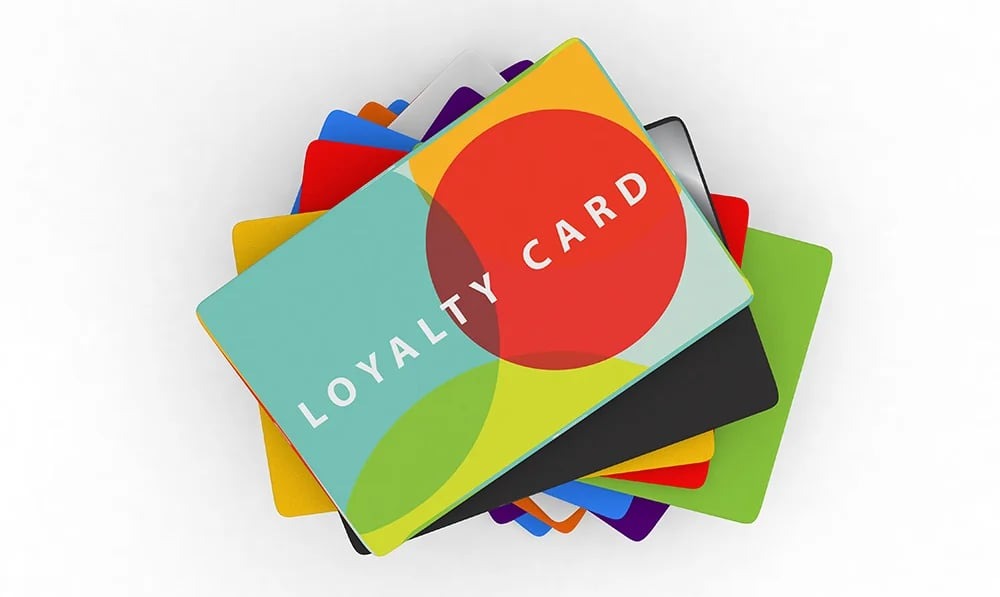
The mechanics of customer loyalty schemes
There are a number of different types of customer loyalty scheme, each tailored to suit the unique needs and preferences of businesses and their customers, which include the following:
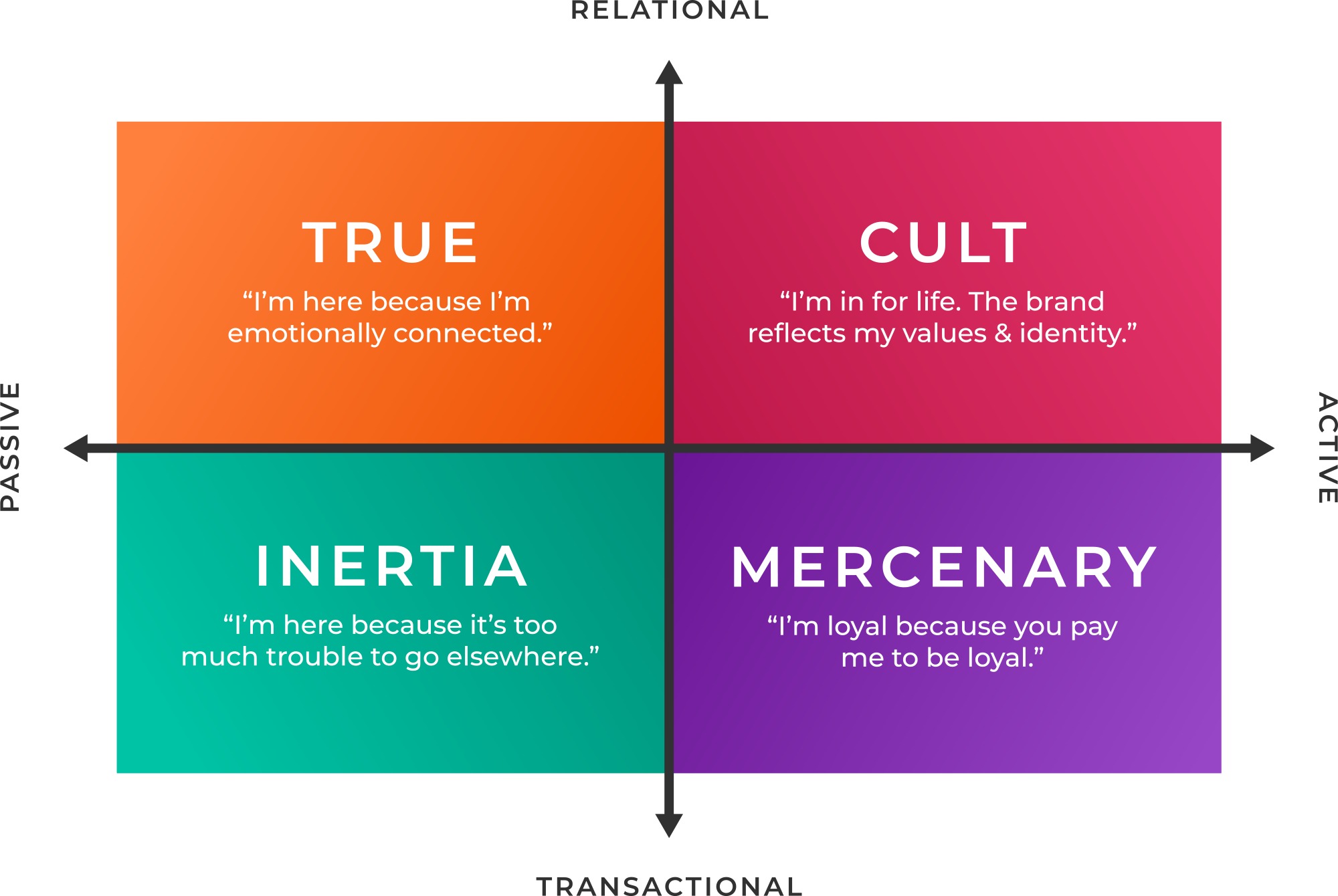
The different types of customer loyalty
Not all loyalty is the same. In fact, some loyalty isn’t even loyalty! (Wait… what?).
Let’s just take a look at loyalty you have for brands that you probably interact with on a day-to-day basis… You shop at your favourite supermarket most likely because it’s convenient, and prices are relatively competitive. Maybe it’s around the corner, and even if they’re more expensive than other places, it’s probably only a few pence so not worth quibbling over. The problem is, if you move house, or if the prices rise enough that you think it’s maybe worth an extra 5 minutes in the car, you’re off somewhere else! The supermarket thinks you’re loyal because you’re back there every week, whereas in reality you’re ready to go at a moment’s notice.
On the other hand, let’s imagine your favourite coffee shop, maybe one where you’re friendly with the barista who makes your flat white just the way you like it. Not only will you go an extra 30 minutes out of your way just to get a coffee on the way to work, but you’ll rave about them to your friends. “You should come and see Jo at Bean-2-cup, honestly she makes the best flat white, I won’t go anywhere else!”. This is loyalty most brands only dream of.
Maritz’s loyalty quadrant (which we’re lovingly re-creating with our colours!) organises different loyalty into four types – true, cult, inertia and mercenary. These are then split on two axes by whether the loyalty you’ve built is relational or transactional (are you focused on price, or offering an exceptional and emotional relationship?), and whether the customers are passive or active in their interactions with your brand and with their loyalty.
1. Inertia loyalty – “I’m here because it’s too much trouble to go elsewhere.”
This type of loyalty almost isn’t loyalty at all. Sure, the customers keep coming back for more, but that’s only because there is a barrier to exit, not because they love your brand and have an emotional connection. It could be that they’re not aware of an alternative product or service, so buy from you for ease, or it could be that the price is within their budget. It’s unlikely that these customers will recommend you to other people. The risky thing about this type of loyalty is that there’s a high chance of them being influenced by your competitors. All your competitors would need to do is run a decent promotion to convince this customer it’s worth an extra 5 minutes out of their day to switch and BAM – they’ve nabbed them from you! So how can you encourage true or cult loyalty with this group? A lot of the activities will need to focus around education and reward. Educating them not only about your products and the value of them, but also about your business values and beliefs in the hope that they relate with them. As they start to learn more and are rewarded for their time and loyalty, their opinions may change.
2. Mercenary loyalty – “I’m loyal because you pay me to be loyal.”
Like inertia loyalty, this type isn’t exactly ideal for your business. To put it bluntly, they are loyal because of some sort of bribe. These people love shopping around for the best deals, discounts and rewards, therefore are easily influenced by your competitors. If you are continually trying to attract these customers from your competitors, you’ll get trapped in a race to the bottom. You need to be very cautious of this type of loyalty as they’re only attracted to your offers, and not your products, services, beliefs or values. You can alter their mindset from being “money driven” to “value driven” by educating them on the value of your products so they can see what they’re getting for their money, rather than promoting the discounts on offer.
3. True loyalty – “I’m here because I’m emotionally connected.”
First up, we have true loyalty. This type of loyalty means customers have an emotional connection with your business, like believing you share some of their values. They are very happy with the products or service you offer and are unlikely to be influenced by your competitors. Although they respect and admire your business, they aren’t quite ready to be recommending you to everyone they meet! These customers are already very happy with what you offer, but you should still continue to reward their loyalty and reinforce that behaviour. You should try and introduce ‘wow moments’ and extra special VIP service for special customers, and maybe start to encourage them to tell their friends by rewarding referrals.
4. Cult loyalty – “I’m in for life. The brand reflects my values and identity.”
The customers that show “cult loyalty” are your brand evangelists, and your brand forms part of their identity! Like true loyalty, as discussed in the point above, they have an emotional connection with your business and share your values and beliefs, but more importantly, they think your brand represents their values and beliefs to others. These customers are very unlikely to shop elsewhere and be disloyal. These customers are almost an extension to your sales team, and LOVE to rave and shout about your products, service and their experience to their friends and family. They know you won’t let them down, and might make them look good to their friends toboot! Be careful though, if you drop your service levels and make bad on a recommendation they’ve made of you, there might not be any coming back…
So it’s important to ask yourself…
Do your customers want to ‘Snog, Marry or Avoid’ your brand?
Our CEO Richard explains here:
5 Loyalty Programme Myths
Have you fallen prey to some of the most common customer loyalty myths out there? Take a look at what’s been travelling through the grapevine lately, and exactly why it’s a mistake to take them as truth.
 Myth: It’s too time consuming
Myth: It’s too time consuming
Fact: The right loyalty programme doesn’t need to represent a big, ugly drain on your time. It’s more than possible to maintain a successful scheme without sacrificing all your time to it.
Devising a customer reward programme from scratch can be very time-consuming, but there’s no reason why already-busy companies should have to devote their own time and energy to building something worthwhile brick by brick.
This is our particular area of expertise at Incentivesmart – building loyalty programmes that integrate easily and seamlessly with your existing processes. For instance, our work with Fluid saw us integrate our rewards platform with their existing CRM system, meaning the additional ‘work’ of running the scheme was automated, and the business didn’t need to disrupt flow just to make it operable.
 Myth: Vouchers work just as well
Myth: Vouchers work just as well
Fact: Vouchers aren’t totally useless, and they can be appreciated, but they’re not memorable, they feel restrictive, and they’re definitely not fun.
Vouchers are there to be redeemed against a subsequent transaction, and businesses like them because they encourage customers to return for that subsequent transaction. This is good for encouraging a little extra return business, but is that comparable to long-term loyalty from customers who are really motivated to give you as much business as possible? How compelling can a voucher get?
A varied and exciting rewards catalogue is something that’s worth working towards. You just can’t generate that same level of excitement with vouchers unless those vouchers are worth considerable cash – and where’s the benefit for you in that?
Some businesses will offer vouchers that work at more than one business. Love2Shop is a good example of this. There are some benefits there since they’re more compelling and memorable than a voucher for, say, 10% off from the business that issued it, but it also limits the amount of data you can gather on your customers – and data is one of the major benefits of running a loyalty programme.
 Myth: The Reward Doesn’t Matter as Long as We’re Doing Something
Myth: The Reward Doesn’t Matter as Long as We’re Doing Something
Fact: Wrong, wrong, wrong! Your rewards catalogue can make or break your incentive programme.
Ah, the old ‘it’s the thought that matters’ chestnut. This is very true in plenty of scenarios – Christmas gifts from your great-great grandmother or a teacup of tepid tap water ‘tea’ served up by a toddler, for instance. But, when it comes to rewards extended to customers who could transform your retention and churn rates, it would be a big mistake to assume they’ll sip happily away, rub their bellies, and say, ‘Yum!’
Now more than ever before, customers are very switched on to the strategies companies use to win their business. This is as true in B2B as it is in B2C, and it’s very important that modern businesses design everything – from marketing to rewarding – around the understanding that customers are cynical, and they know when they’re being undervalued.
Offering the right rewards – whether you’re looking for channel partner incentives or opportunities to reward your own employees – is imperative. It means the difference between causing the release of those happy chemicals and leaving customers feeling cold and disinterested (at best) or irked and repelled (at worst).
The time when we could be generic and bland has long-since passed. So many businesses – the overwhelming majority, in fact – offer loyalty schemes, but customers will only buy into a handful. Stand out on the strength of your rewards catalogue. If they don’t see things that interest them, why bother collecting the points?

 Myth: Loyalty only lasts until the next competitor runs a deal
Myth: Loyalty only lasts until the next competitor runs a deal
Fact: Most customers are looking to align with brands that showcase their values, particularly when it comes to customer-centrism. Loyalty is worth more than a rival sale or promotion – that’s what makes it so valuable.
The types of customers who are willing to jump from one brand to the next depending on what deals are running at that moment aren’t the kind of customers you should be working to acquire. These customers will ‘love you as they leave you’ in the sense that they will be drawn in by your promotion, and drawn away by a rival promotion.
We refer to these types of customers as ‘mercenaries’, and there’s very little benefit in targeting them. They drive-up first-time business, but they also drive-up your churn rate.
By focusing on long-term loyalty, you begin to take on more of the ideal type of customer: the evangelist. These customers aren’t just bringing return business, but genuine engagement that gets you more word-of-mouth recommendations, and a higher ROI over the long haul.
 Myth: It’s better to just shrink margins and improve customer service.
Myth: It’s better to just shrink margins and improve customer service.
Fact: This is risky. Where does it end? While improving customer service is always a good thing, you can’t make endless improvements, just as you can’t endlessly shrink margins.
This is a common trap for businesses to fall into – the idea that they just need to be more competitive to keep winning over business. There’s a certain amount of truth in it – after all, most of us are suckers for a great deal – but this can’t be a ‘one and done’ strategy. Eventually, those shrunken margins will be rivalled by another business, and you’ll need to shrink them thinner still to keep competing at the same level. That’s why they call razor-thin margins business kryptonite.
Improving customer service and making better use of those B2B communication opportunities will always serve the business, but don’t consider that an alternative to strategising customer loyalty.
Take yourself out of this vicious cycle as soon as you can. You and your customers will be better for it.
Ready to kickstart your own customer loyalty scheme?
Launching a loyalty scheme for your business should be at the top of your priority list to keep your customers returning time and time again. While building a devoted customer base might not happen overnight, there are a few key crucial aspects to keep in mind: make it easy to use, actively share its advantages with your customers, and closely keep an eye on how it performs.
As you embark on this new business journey, remember that nurturing these valuable customer relationships is a gradual process that requires time and patience, but the lasting impact will make every step worthwhile.




